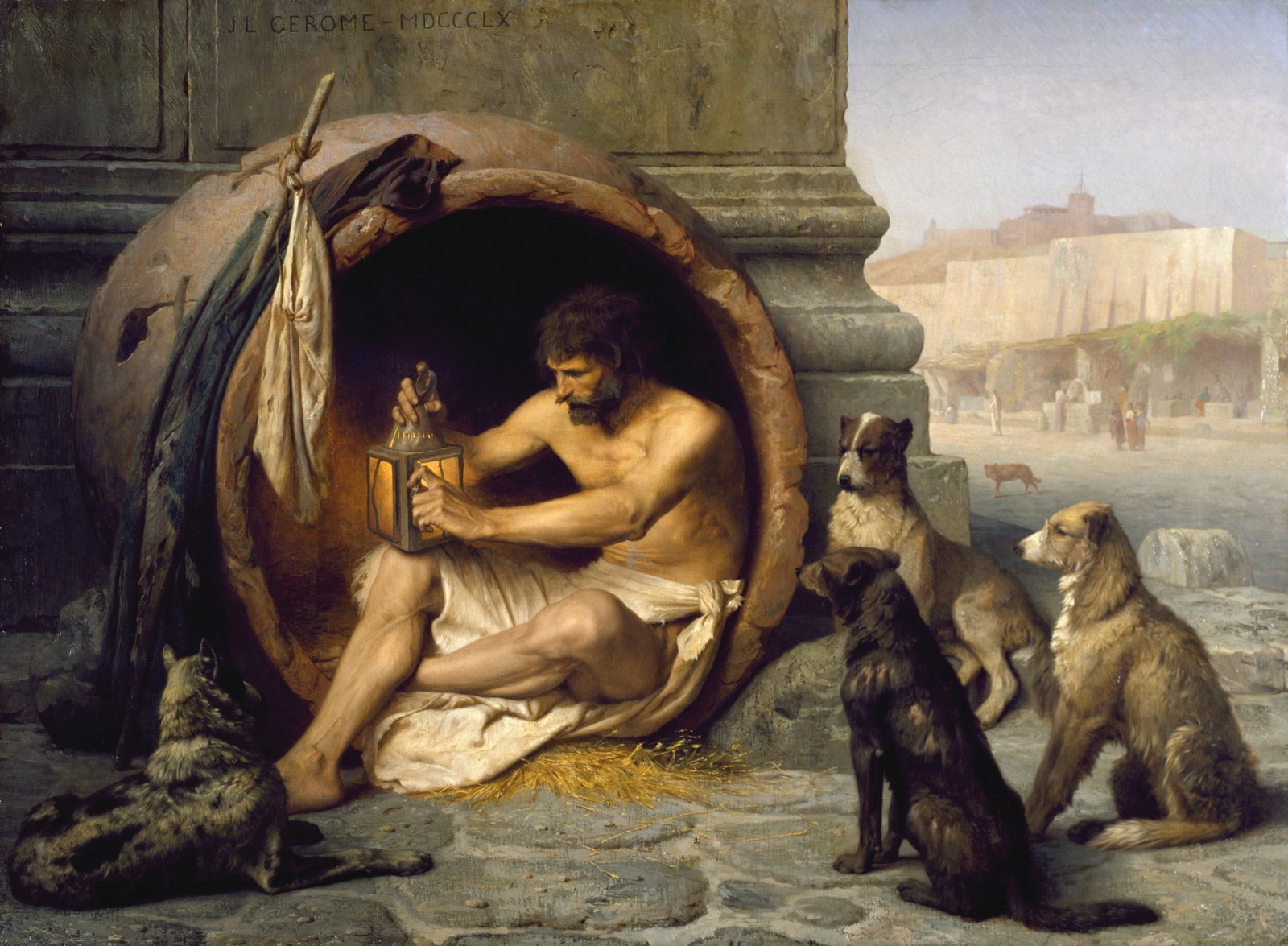Kant is writing in the wake of Isaac Newton, and one of the things that Kant believed about Newton’s great scientific discoveries was that they showed that everything that happens in the physical world was completely determined by inexorable laws of nature. So, in principle, if you knew all of the prior conditions before some event and if you knew what all the laws of nature were, you would be able to predict with certainty exactly what was going to happen next. Kant also believed that it was a direct consequence of this that there could be no free will in the physical world, that nothing that any of us does in the physical realm could constitute an exercise of freedom because it was all completely outside our control. If I raise my hand, for example, there's some purely physical story that you can tell about why that happened. No doubt that physical story involves a certain amount going on in my brain but, even so, whatever it is has been determined to go on by antecedent physical conditions stretching all the way back to whatever initiated it. It's a very urgent question for Kant: what possible room is there for freedom, for exercises of free will?
Adrian Moore
Kant and how to live in purely rational terms
Adrian Moore, Professor of Philosophy at the University of Oxford, explores the practical use of reason and morality in Kant’s system.Key Points
- • Even though Kant recognised that everything in the physical world is governed by predetermined factors, we are still free agents as we ourselves are part of the underlying reality.
- • Kant believed that deciding between the right and wrong thing to do could be based on pure reason.
- • The belief that there are fundamental principles of right living and others that are absolutely wrong has been the most enduring and influential of Kant’s ideas
What possible room is there for freedom?

Photo by photoshooter2015
Kant’s reconciling project
It looked as if the great scientific discoveries of the 17th century, and in particular Isaac Newton’s scientific discoveries, had shown that there's no such thing as free will. But actually that pessimistic conclusion was not Kant's. Kant thought that despite all of this it was possible for us to acknowledge exercises of a free will, and to make sense of the idea that we were free agents. To understand Kant’s reconciling project here we have to go back to the very basic structure of his philosophical system, which can be understood in terms of a popular metaphor that's often used to characterise that system.
Kant’s view was that each of us carries around with us something like a metaphorical pair of spectacles through which we view things. Because we view things through these spectacles, we're only ever aware of appearances and not really how things are in themselves beyond the spectacles. We can't do with these metaphorical spectacles what we can do with a literal pair of spectacles, which is to take them off and look at things directly. There's no such process in the case of the metaphorical spectacles. So Kant is working with a very profound and very important distinction between how things appear through the spectacles and how they really are in themselves. It's a very radical view. The mere idea that there's a distinction between appearance and reality is perhaps not so radical in itself, but Kant’s version of that idea is very radical because part of these native spectacles is space and time themselves.
Things in themselves as neither spatial nor temporal
Kant believed that the very fact that things appeared to us spatio-temporally is a fact about how things appear to us. Things in themselves are neither spatial nor temporal. We have absolutely no idea what they are like, but they're not spatial and they're not temporal.
So now we have the resources to understand how Kant can carry through his reconciling project, because what Kant said was, ‘Look, Newton and the other great scientists were concerned with the world of space and time.’ That's what they were investigating. They were investigating the world of appearances. The fact that everything is inexorably determined in the world of space and time is only a fact about the world of space and time. Any physical occurrence, anything that happens in time and anything that has a spatial location is a feature of the world of appearances. And at that level, there is no room for freedom; there are no exercises of free will at that purely physical level. But in Kant’s view there is an underlying reality, that there are exercises of free will, and we ourselves are part of the underlying reality.
Genuine exercises of freedom

Photo by gopixa
So Kant was in a position to say, even if at the level of appearances, there's a sense in which there's no room for free will, because everything is completely determined, that doesn't stop it being a genuine possibility that we have free will as we are in ourselves, that, at the level of things in themselves, there are genuine exercises of freedom. And we were in a position, Kant thought, to have our cake and eat it, to accept both what the scientists had been telling us and to believe in the possibility of free will. In some sense, Kant himself would have said we couldn't really understand, but in some sense if there were genuine exercises of freedom then they would help to determine how things appeared to us, because how things appeared to us was ultimately dependent on how they really were.
How do we tell what counts as the right thing to do?
These are questions that only make sense on the assumption that we're free agents, so it was extremely important for Kant that he should leave room for the possibility that we are free agents. It's extremely important for him that he's been able to carry through his reconciling project. So Kant thinks that we can rest content with what each of us intuitively thinks anyway, which is that there is a difference between right and wrong. There is such a thing as acting morally as opposed to immorally.
Now, the question is: how do we tell what counts as the right thing to do? How do we determine how we should live on the assumption that we have free will and are in control of how we should live? It was Kant's very distinctive view that we could answer these fundamental questions about how to live in purely rational terms. A sheer exercise of reason is able to distinguish between what counts as the right thing to do and what counts as the wrong thing to do.
Pure exercise of reason
Suppose that I've made a promise to somebody and I'm tempted to break that promise for one reason or another. I've reached the point where I have to decide whether or not to fulfil the promise. There are various reasons why it would be significantly in my own self-interest not to keep the promise, and I'm wondering whether just this once I can get away with doing what I know is normally the wrong thing to do.
Kant said, ‘Okay, think about this. If it really is legitimate for me to break my promise on this occasion, then it would be legitimate for anybody to break their promise in similar circumstances.’ The whole point is that the basic, fundamental precepts of morality don't vary from one individual to another or from one situation to another. So I've got to ask myself: what would it be like if everybody decided to break their promise when it suited them for selfish reasons? Kant said that if you think about it you'll soon realise that the whole institution of promising would disintegrate in those circumstances. So there you are seeing a way based on a pure exercise of reason why it's illegitimate ever to break your promises.
Certain fundamental principles of right living

Diogenes of Sinope, oil on canvas 1860 by Jean-Léon Gérome. Walter Art Museum. Wikimedia Commons. Public Domain.
It's this aspect of Kant’s thinking that’s still to this day the most influential. It's in this area of Kant’s thinking that you're most likely to find people who would still be prepared to describe themselves as Kantians. Or, for that matter, that you're still liable to find people who are Kantian, even if they don't describe themselves in that way. This idea that there are certain fundamental principles of right living that apply to us, whether we like it or not, that there are certain things that are absolutely wrong, irrespective of the consequences, is a very powerful and seductive idea. By no means does everybody believe it. There are still plenty of utilitarian thinkers who see things completely differently. And there are yet other schools of thought that are different both from Kantianism and from utilitarianism. But nevertheless, there's a very powerful and seductive idea there about how pure reason can direct us in our lives that, for many people, has lost none of the appeal.
Discover more about
Kant, reason and morality
Walker, R. (1998). Kant and the Moral Law. Orion.
Moore, A.W. (2003). First theme: morality, Second theme: freedom. In Noble in Reason, Infinite in Faculty: Themes and Variations in Kant's Moral and Religious Philosophy (pp. 20–38; 90–112). Routledge.
Moore, A.W. (2006). Maxims and Thick Ethical Concepts. Ratio, 19(2), 129–147.
About Adrian Moore
Here's how we use cookies
To give you the best experience, we tailor our site to show the most relevant content and bring helpful offers to you.
You can update your preferences at any time, at the bottom of any page. Learn more about how your data is used in our cookie policy.